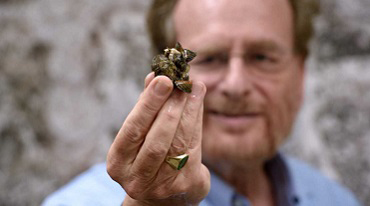
A tour around the world may sound like a dream vacation away from the daily grind, but for Wayne State University School of Medicine Professor of Physiology Jeffrey Ram, Ph.D., visits to Italy, Germany, Singapore, Australia and Japan taken earlier this year were designed to advance his knowledge of methods used internationally to promote student interest in science and science careers via informal education venues such as museums, zoos and aquariums.
Dr. Ram returned in May from a one-semester sabbatical to expand the methods behind his three-year $1.2 million grant from the National Science Foundation for "Promoting Student Interest in Science and Science Careers through a Scalable Place-Based Environmental Educational Program at a Public Aquarium," specifically at the Belle Isle Aquarium in Detroit.
The 2016 grant stimulates science education in K-12 schools in Detroit by training Detroit Public Schools teachers in biological STEM areas related to fisheries, wildlife, conservation and aquatic sciences. In addition, up to 2,300 fifth-graders from the school district will benefit through field trips and follow-up activities. Fifth grade is a critical age in which decisions for lifelong science-related career choices are formed, said Dr. Ram, the principal investigator of the program. However, much work still needs to be done to increase the general interest and knowledge of science and science careers, especially among students in urban school systems. "On my sabbatical, I visited other institutions that have similar programs and have brought ideas back to Detroit to make our funded work go even better than before," he added
Dr. Ram first planned the sabbatical by writing to potential collaborators in whose institution he could do the planned work, with the goal of accomplishing educational change in Detroit by investigating, developing and testing methods applicable to his projects.
He visited Acquario Stazione Zoologica Anton Dohrn in Naples, Italy, and the National Aquarium of New Zealand, with additional consultations, seminars and observations to discuss possible future collaborations with colleagues in Tubingen, Germany; Singapore; and additional locations in Auckland and Hamilton, New Zealand; Sydney, Australia; Japan and the United States.
While on sabbatical, Dr. Ram also completed a book about model systems for the study of human aging, "Handbook of Models for Human Aging," published shortly after his return to WSU.
"On sabbatical, I started gathering more information for the next edition of the book, perhaps to be completed on a subsequent sabbatical. We are currently planning new work related to the contents of the book, a very rewarding experience," he said.
"Sabbaticals are one of the most misunderstood perks of the Academy. To the public, they may seem like glorified vacations, but they really are essential professional development mechanisms that allow faculty researchers the opportunity to create and extend knowledge in ways that are not possible if they still had their usual teaching and service commitments," said WSU Associate Provost for Faculty Development and Faculty Success Annmarie Cano Ph.D. "Whether faculty conduct their sabbatical research locally or across the globe, they are accelerating advancements that can enhance health and well-being and the public good, and through this work they are also providing valuable learning opportunities for Wayne State students."
Tenured and represented faculty who have held their position for at least three years are encouraged to take a one-semester sabbatical. Those with six years in their position may take a two-semester sabbatical. Faculty must have approval from their department chair and the School of Medicine dean. Applications are accepted once a year for the following academic year. The deadline to apply for a sabbatical for the 2019-2020 academic year is Nov. 15. (Click here to complete the application).
Dr. Ram has taken three additional sabbaticals throughout his career.
"I have found in the past that visiting other institutions exposes me to new ideas and techniques and sometimes generates new collaborations. Also, the time 'away' helps to clear my desk so that I can finish up sometimes long-delayed papers that I've been working on. I also enjoy traveling and meeting new people and cultures, and the sabbatical provides an opportunity to do so," he said.
He is now working on several grant proposals and recruiting student assistants to work on ideas or use new techniques that he learned.
What is Dr. Ram's advice for someone thinking about a sabbatical? "Take it. If you see the benefits of the change of environment and the stimulation of new ideas and people, you will be motivated enough to make it work," he said. "Some people see their lab or courses or even their home as a place where they simply cannot be absent for more than a few days. It is not true. If you are motivated enough and your family, colleagues and chair see the benefit, you will find that they will help you make it possible."